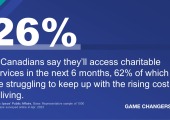Commercial Farming Worse than Last Year
SIX IN TEN (60%) COMMERCIAL FARMERS IN THE PARIES AND ONTARIO SAY THE ECONOMIC HEALTH OF THEIR FARM IS WORSE THAN LAST YEAR
This Angus Reid Group press release is based on two telephone surveys. The first survey was conducted between August 6th and August 22nd, 1999 among a representative cross-section of 878 commercial farmers in the Prairie Provinces and Ontario. These data are statistically weighted to ensure the sample's composition reflects that of the actual farming population with farms over 320 acres of cropland in the Prairie Provinces and over 100 acres of cropland in Ontario. With a sample of 878 farmers, one can say with 95 percent certainty that the overall results are within +3.3 percentage points of what they would have been had the entire farming population in the Prairie Provinces and Ontario been polled. The margin of error will be larger for other sub-groupings of the survey population.
A second survey was conducted between September 7th and 12th, 1999 among a representative cross-section of 1,500 Canadians aged 18 and older. These data are statistically weighted to ensure the sample's regional, age and gender composition reflects that of the actual adult Canadian population according to 1996 Census data. With a sample of 1,500, one can say with 95 percent certainty that the overall results are within +2.5 percentage points of what they would have been had the entire adult Canadian population been polled. The margin of error will be larger for other sub-groupings of the survey population.
In a survey conducted this past month among 878 commercial farmers in the Prairies and Ontario, it was found that six in ten (60%) farmers say the economic health of their farm is worse than last year. And, only one quarter (24%) expect their farm will earn a profit over the course of the year. Regardless of their economic situation, most farmers (81%) do not believe the government is "doing enough for farmers in terms of financial assistance". Indeed, 39% of the farmers interviewed suggest they will be out of farming or considering getting out of farming without commodity price increases or government support over the next year. The survey also shows that producers operating smaller farms (based on gross farm sales) and Western farmers feel more vulnerable and are the least likely to believe they will be able to make a profit or continue farming without commodity price increases or government support.
What's more, in a companion national survey among 1,500 Canadians adults, it was found that most Canadians recognize the plight of the farmers: 72% agree that farmers are facing severe problems, and half (52%) say the federal government is not doing enough to help them.
WHAT THE FARMERS SAY
SIX IN TEN (60%) FARMERS SAY THE ECONOMIC HEALTH OF THEIR FARM IS WORSE THAN LAST YEAR
Six in ten (60%) farmers in the Prairie Provinces and Ontario say the "economic health of their farm is worse than last year". Twenty nine percent say the economic health of their farm is "about the same as last year", while only 10% say it's "better than last year".
- Producers operating smaller farms (under $250,000 in gross farm sales), those in the West (68% versus 41% in the East) and, more specifically, Saskatchewan farmers (74%) are most likely to say the economic health of their farm is worse this year than last year.
ONLY ONE QUARTER (24%) SAY THEIR FARM WILL EARN A PROFIT THIS YEAR
Only one quarter (24%) of the farmers included in this survey expect their farms to make a profit this year. Four in ten (39%) predict that their farm will "break even" overall. Roughly, one third (35%) expect to "lose money" over the course of the year.
- Eastern farmers (41%) are far more likely to predict an overall profit for their farm this year than Western farmers (16%). In fact, farmers from the West (41%) are twice as likely as Eastern farmers (21%) to indicate they will lose money this year.
- Producers with gross farm sales of greater than $250,000 are the most likely to predict an overall profit for their farm this year (39% of farmers with sales $250,000 to $500,000 and 49% of farmers with sales greater than $500,000). On the other hand, smaller farm operations are most likely to expect a loss this year (31% of farmers with sales of $100,000 to $250,000 and 47% of farmers with sales of $50,000 to $100,000)
MOST FARMERS (81%) SAY THE GOVERNMENT IS "NOT DOING ENOUGH"
Most farmers (81%) think the government is "not doing enough for farmers in terms of financial assistance". A mere one in seven say the government is "doing about the right amount" (13%) or "doing too much" (2%).
- Even for those who say they are better off this year than last year (75%) and those who believe their farm will make a profit (63%), the government is, for the most part, not seen to be doing enough for farmers.
- Western farmers (87%) are more likely to suggest that "the government is not doing enough for farmers" than Eastern farmers (66%). Saskatchewan farmers lead in disapproval of the government's financial assistance to farmers (93%) followed by Manitoba (88%) and Alberta (77%) farmers.
WITHOUT COMMODITY PRICE INCREASES OR GOVERNMENT SUPPORT, 39% MAY GET OUT OF FARMING
Without commodity price increases or government assistance, 39% of the farmers interviewed said they would either "seriously consider getting out of farming" (35%) or "have gotten out of farming" (4%) by next year. Six in ten (59%) say they are "confident they will continue farming" whether the prices increase or government support is given.
- Consistent with the above findings, smaller farm operations (based on gross farm sales) have the lowest level of confidence with continuing to farm. Confidence in continuing to farm increases as gross farm sales increases.
- Ontario farmers (74%) are more likely to be confident in their ability to continue farming without commodity price changes or government assistance - compared to the Prairie Provinces (53%).
- Confidence is positively correlated with farmers' prediction of how well their farm will do economically and whether or not it will make a profit this year. As perceived success over the course of the year increases, so too does the likelihood that the farmer will be confident in having the ability to continue farming next year without government assistance or price increases (see detailed tables).
WHAT CANADIANS SAY
Seven in Ten (72%) Agree Farmers are Facing Severe Problems
Asked to choose which of two statements most accurately reflects their own point of view, more than seven in ten Canadians (72%) agree that Canadian farmers "really are facing severe problems right now". One in four (25%), on the other hand, say farmers "are always complaining but they are not really that badly off".
- The opinion that Canada's farmers are facing severe problems is most prominent among residents of Atlantic Canada (81%), British Columbia (76%), or Saskatchewan/Manitoba (76%), and university graduates (77%).
- The feeling that the farmers are always complaining is strongest among residents of Quebec (35%), men (29%), and those without a high school diploma (35%).
52% Say Federal Government Not Doing Enough for Canada's Farmers
A slim majority (52%) of Canadians say the federal government "has not been doing enough" for Canada's farmers. About one in three (35%) say the Feds are doing "about the right amount", while seven percent say the government is "doing too much" for Canada's farmers.
- At 73%, residents of Saskatchewan/Manitoba stand out as being significantly more likely than any other subgroup (regional or socio-economical) to say the federal government is not doing enough for Canada's farmers.
- The feeling that the federal government is doing too much to help the nation's farmers is most notable among those without a high school diploma (11%) and respondents aged 55 and older (11%).
54% Aware of Farmer Protests and Rallies
The majority of Canadians (54%) have heard, read or seen something recently about farmer protests and rallies on the current farm economic situation. The awareness level is significantly higher among residents of Saskatchewan/Manitoba (89%) or Alberta (68%), respondents aged 55 and older (65%), and university graduates (63%).
- In the Atlantic Provinces (54%) and Ontario (53%) a majority have not heard anything about these protests and rallies. The same is true among 18 to 34 year olds (56% unaware of protests).
Two Thirds (64%) Believe Protests Effective for Informing Public
About two thirds of Canadians think that farmer protests - such as blocking traffic or holding rallies - are either a very effective (15%) or a somewhat effective (49%) way to inform the public about the poor farm economy. Just over one in three (36%) feel such protests are not at all effective as a means of informing the public.
- Most likely to say protests are a very effective means of public information are residents of Saskatchewan/Manitoba (19%).
- The feeling that protests are only somewhat effective is most prominent among Albertans (60%).
- Residents of Quebec (44%) are most likely to say protests are not at all effective.
- There are no significant variations along socio-economic lines.
For further information contact:
Gary Bennewies
Executive Vice President
Angus Reid Group
(204) 949-3100
The Angus Reid Group is Canada's largest and most well-known Canadian research company. Established in 1979 by Dr. Angus Reid, the company serves 1200 clients via its six offices in Canada, four offices in the United States and its European office in London, England. With a complement of 250 full time qualitative and quantitative researchers, the company has annual revenues of $65 million and is growing at an average rate of 30 percent per year. The employee-owned company also operates its own field service entity, Direct Reid, utilizing 450 CATI (computer-assisted telephone interviewing) stations for North American calling and a 50,000 household consumer panel in Canada.
More insights about Consumer Goods


![[WEBINAR] KEYS: Uncharted Territory](/sites/default/files/styles/related_more_insights/public/ct/event/2025-07/thumbnail-templates_2.jpg?itok=HWGWYWt9)
![[WEBINAR] Canadian EV Adoption Trends in 2025](/sites/default/files/styles/related_more_insights/public/ct/event/2025-01/thumb.png?itok=RSGzZvMm)
![[WEBINAR] Sustainable Packaging: A Potential Avenue of Distinction](/sites/default/files/styles/related_more_insights/public/ct/event/2023-09/SustainablePackaging_WebR_feature%20copy.jpg?itok=X0DpNf_C)